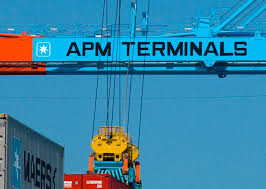Andrew
Dawes, Managing Director, APM Terminals Apapa, Lagos, on Tuesday said the
company had set a new productivity milestone for container terminals in
Nigeria.
Dawes, Managing Director, APM Terminals Apapa, Lagos, on Tuesday said the
company had set a new productivity milestone for container terminals in
Nigeria.
A
statement by Austine Fischer, the terminal’s Communications and Sustainability
Manager, made the disclosure in Lagos.
statement by Austine Fischer, the terminal’s Communications and Sustainability
Manager, made the disclosure in Lagos.
“While
handling Safmarine’s vessel, the 62,557 DWT, 4,500 TEU MV Safmarine Chambal,
APM Terminals handled 868 container moves during an 11 hour, 30 minutes
operation.
handling Safmarine’s vessel, the 62,557 DWT, 4,500 TEU MV Safmarine Chambal,
APM Terminals handled 868 container moves during an 11 hour, 30 minutes
operation.
“Gross
crane productivity was 19 container moves per crane per hour, resulting in
berth productivity of 75.63 moves per hour.
crane productivity was 19 container moves per crane per hour, resulting in
berth productivity of 75.63 moves per hour.
“This
is the first time APM Terminals have crossed the important benchmark of 75
berth moves per hour and we believe we are the first container terminal in
Nigeria to have done so.
is the first time APM Terminals have crossed the important benchmark of 75
berth moves per hour and we believe we are the first container terminal in
Nigeria to have done so.
“We
believe this sets a new benchmark for container terminals in Nigeria,’’ the
statement made said.
believe this sets a new benchmark for container terminals in Nigeria,’’ the
statement made said.
The
statement also quoted Jan Thorhauge, Managing Director, Maersk Line, Nigeria,
as saying: “Consistent high terminal berth productivity is a critical cost
driver for all shipping lines.
statement also quoted Jan Thorhauge, Managing Director, Maersk Line, Nigeria,
as saying: “Consistent high terminal berth productivity is a critical cost
driver for all shipping lines.
“It
translates directly into significant bunker cost savings for the industry and
thereby lower overall supply chain costs for the Nigerian importers.
translates directly into significant bunker cost savings for the industry and
thereby lower overall supply chain costs for the Nigerian importers.
“Achieving
the levels of productivity delivered by APM Terminals on the MV Safmarine
Chambai with a Mobile Harbour Crane operation is quite remarkable.
the levels of productivity delivered by APM Terminals on the MV Safmarine
Chambai with a Mobile Harbour Crane operation is quite remarkable.
“We
are delighted and offer our congratulations to the operational team at APM
Terminals’’.
are delighted and offer our congratulations to the operational team at APM
Terminals’’.
The
statement added that with a container throughput of 699,000 TEU in 2014, APM
Terminals Apapa was the leading container terminal in Nigeria by market share.
statement added that with a container throughput of 699,000 TEU in 2014, APM
Terminals Apapa was the leading container terminal in Nigeria by market share.
“Since
2006, APM Terminals has invested 350 million dollars in expansion and upgrades
to infrastructure more than doubling capacity.
2006, APM Terminals has invested 350 million dollars in expansion and upgrades
to infrastructure more than doubling capacity.
“This
was while eliminating vessel waiting times, improving productivity and removing
bottlenecks thereby reducing supply chain cost for Nigeria’s business
community,’’ it said.
was while eliminating vessel waiting times, improving productivity and removing
bottlenecks thereby reducing supply chain cost for Nigeria’s business
community,’’ it said.
The
statement added that as the only container terminal in Nigeria with rail
services, APM Terminals Apapa now operated three weekly rail services to the
inland cities of Kaduna and Kano.
statement added that as the only container terminal in Nigeria with rail
services, APM Terminals Apapa now operated three weekly rail services to the
inland cities of Kaduna and Kano.
It
said it carried 730km and 960km from Lagos respectively, thereby providing a
key corridor to Nigeria’s inland cities and helping to reduce the traffic
bottleneck around the Lagos ports.
said it carried 730km and 960km from Lagos respectively, thereby providing a
key corridor to Nigeria’s inland cities and helping to reduce the traffic
bottleneck around the Lagos ports.


































































